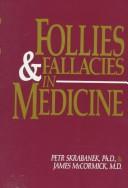Follies and Fallacies in Medicine (1989) by Petr Skrabanek and James McCormick
“Books do not arise of themselves; they do not emerge from the primeval slime, but are grafted on to some bizarre selection of everything that has gone before, a selection which is determined by the past experience of their authors”.
The Interdisciplinary approach to science and human reasoning generally, has much to recommend it.* By this we mean new insights, or evidence weighing against established theories in one field, that may profitably be used to re-examine areas in another field of knowledge .There are books published that confine their criticisms to the field their writers are familiar with, or feel best placed to give examples, but which can often be applied in ways the authors themselves may not at first have reckoned with, or conversely, deliberately scattered seeds for others to cultivate elsewhere. One such book is Follies and Fallacies in Medicine. It is not easy to obtain.
The authors aim as stated, ‘is to reach inquisitive minds, particularly those who are still young and uncorrupted by dogma. We offer no solutions to the problems we raise because we do not pretend to know of any. Both of us have been thought to suffer from ‘scepticaemia’ (an uncommon generalised disorder of low infectivity. Medical school education is likely to confer life-long immunity) but are happy to regard this affliction, paradoxically, as a health-promoting state..’
Many examples of erroneous reasoning, obfuscation, faulty logic and accidental misinformation are given; they are not concerned with deliberate falsification, deception or fraud, which can at times pollute the scientific literature. It appears that there is a need to spell out cautions necessary to establish truth, for even the best intentioned author will have a personal bias, a tendency to form a conclusion or a belief before the evidence necessarily justifies it’..
Is this really a problem? Some researchers eliminate data that does not support what they want to prove; some report more tests or trials than were actually run; appropriate for their own use data or ideas of other researchers (plagiarism); or make up experiments or data they never performed or produced. “What is the major product of scientific research these days? Paper”, ‘U.S.News & World Report’ said. “Hundreds of new journals are being founded each year to handle the flood of research papers written by scientists who know that the road to academic success is a long list of articles to their credit.” Quantity, not quality, appears the goal. Forty thousand journals published yearly produce a million articles, and part of this flood “is symptomatic of fundamental ills, including a publish-or-perish ethic among researchers that is stronger now than ever and encourages shoddy, repetitive, useless or even fraudulent work.”
These are the fallacies presented I wish to focus on, for the applicability to wider horizons in science than simply medicine. Firstly, the ‘faggot fallacy’. ‘In England, traditionally a faggot is a bundle of smallish sticks. The faggot fallacy is a belief that multiple pieces of evidence, each independently weak, provide strong evidence when bundled together. The practice may be demonstrated when a number of older studies are accumulated in support of the author’s contention. This is suspect for two reasons. The conclusion can only be valid if the supporting studies themselves were valid, and the conclusion may only appear significant if bolstered by the results of the other studies’.
Next, examine the ‘weight of evidence’ fallacy. ‘Karl Popper taught an approach to science beginning with the premise that what distinguishes science from non-science is the possibility of refutation, thus progress is made from subjecting hypotheses to the most rigorous attempts to prove them wrong. Popper used the example of the black swan: the statement ‘all swans are white’ is little strengthened by the sight of the thousandth white swan, but destroyed by the sight of one black swan. The only subsequent assurance necessary is that the black bird is indeed a swan. The exception destroys the rule. Hence in the search for truth there is little point in endlessly focusing on confirmatory evidence, it is the discordant which offers the possibility toward better understanding. Unfortunately, we are all too familiar with the temptation to reject the uncomfortable pieces of evidence which do not fit a cherished belief’.
‘It appears that new ideas are often easier to accept if they offer a relatively simple solution to a complex problem. This is the fallacy of ‘simple explanation’. However, if an explanation is so simple that it explains everything in general, it often explains nothing in particular. Likewise with the fallacy of the ‘golden mean’, best pictured by the convening of a panel of experts in order to obtain a consensus view. One thing at least is certain- no one knows the truth, if they did, there would be no need for the conference. Scientific truth is established on the basis of irrefutable evidence, not on majority opinion. It is commonly held that the truth reposes in moderation somewhere between two extremes. But if one view holds 2+2=6, and another 2+2=4, does 2+2=5 ? Such a view is neither sensible nor safe’.
‘Again, take the ‘Bellman’s fallacy’. In Lewis Carroll’s ‘The Hunting of the Snark’, the Bellman says: ‘What I tell you three times is true’. A modern example is the belief that spinach is a rich source of iron, which led to the creation of the Popeye-spinach myth. It has been traced to a mistake by the researchers in the 1930’s who put the decimal point in the wrong place and made a ten-fold overestimate of iron content, repeated ad infinitum since. The fact is that there is more iron in eggs, beef, pork, liver, shellfish, pulses, even brown sugar. This leads on to the next fallacy, the ‘fallacy of authority’. This results in people believing things are true because of the authoritative source of the information. ‘It must be true because I read it in the newspaper, I saw it on television, the surgeon/doctor/lawyer said so’, etc. etc’.
Applying these fallacies to another well-known example, take the assertion “Evolution is a fact.” This is the standard confession of faith that assures the scientific community of the author’s orthodoxy. In addition, the claim is often added: ‘It has been proved so often that there is no longer any need to repeat the proof.’ Yet, for years the statement has been made again and again: “Evolution is a fact.”
In a book review for The New York Times Book Review magazine, biologist Richard Dawkins wrote: “We are here talking about the fact of evolution itself, a fact that is proved utterly beyond reasonable doubt.” He then said that to consider creation “in biology classes is about as sensible as to claim equal time for the flat-earth theory in astronomy classes. Or, as someone has pointed out, you might as well claim equal time in sex education classes for the stork theory. It is absolutely safe to say that if you meet somebody who claims not to believe in evolution, that person is ignorant, stupid or insane..”
Stephen Jay Gould wrote an essay on evolution in the January 1987 issue of the science magazine Discover. In this five-page article he proclaimed evolution to be a fact 12 times! Excerpts from the article follow:
Darwin’s lifework was “establishing the fact of evolution.” “The fact of evolution is as well established as anything in science (as secure as the revolution of the earth about the sun).” By the time of Darwin’s death, “nearly all thinking people came to accept the fact of evolution.” Gould spoke of it as “secure fact” and “the fact of transmutation.” “Evolution is also a fact of nature.” “Evolution is as well established as any scientific fact.” “Our confidence in the fact of evolution rests upon copious data.” He speaks of biologists’ agreement “about the fact of evolution.” “Theologians haven’t been troubled by the fact of evolution.” “I know hundreds of scientists who share a conviction about the fact of evolution.”
Molecular biologist Michael Denton referred to this glib talk about evolution’s being a fact and dismissed it with these words: “Now of course such claims are simply nonsense.” It’s much more than nonsense. It deceives and misrepresents. Newspapers, radio, TV, nature series, science programs, school textbooks—all drum this evolution-is-a-fact litany into the public mind.
‘Respect for authority is the basis for most education. Students grow used to memorising information from textbooks and college lectures, and the reason when questioned so often seems: ‘We have to pass our examinations’. Distrusting authority should not be equated with anarchy, or denying the useful role of authority. It may be wise to accept, at least provisionally, what an authority has to say, it is unwise and dangerous to unconditionally believe. The fallacy of ‘everybody says so’ seems to lie behind some of the spurious observations in textbooks nobody has bothered to check, reproduced time after time, and gathering their own momentum’.
‘In 1979, Professor Thomas Gold described the ‘Gold Effect’. At the beginning a few people arrive at a state of near-belief in some idea. A meeting is held to discuss the pros and cons of the idea. More people favouring the idea than those disinterested will be present. A committee is formed, a specialised journal to propagate the idea will be launched, and only peer-reviewed orthodox or near-orthodox articles will pass for publication.
The effect would be observed even if there were no deliberate selection of believers in the subsequent steps. In reality, human frailties augment the whole process. Once the idea takes hold, and becomes acceptable to ‘reputable journals’, it becomes difficult to counter. The human gregarious instinct, the need to ‘belong’ will also tend to draw together people that entertain the same beliefs. Articles on the idea, initially starting with ‘Evidence has accumulated’, rapidly move on to articles which open ‘The generally accepted..’ and before long ‘It is well established..’ and finally to ‘It is self-evident that..’’, or of course, ‘Only the ignorant, stupid, or insane disbelieve..’
‘Follies and Fallacies in Medicine’ does not aspire to provide simple solutions to complex problems. It is no more than a contribution to the limitation of error. It acknowledges the debt we all owe modern medicine; yet exposing folly does no harm, indeed accelerates progress.
*See Wikipedia article: http://en.wikipedia.org/wiki/Interdisciplinary